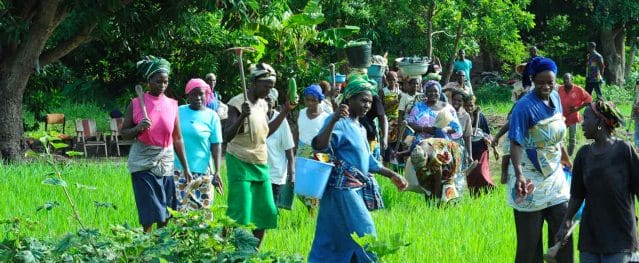
In order to boost the professional capacities, incomes and access to finance of thousands of Ivorian women smallholder farmers in the staple food sector, IFC and the African Development Bank’s Affirmative Finance Action for Women in Africa (AFAWA) initiative announced today a new partnership program.
The three-year advisory project – in consultation with Côte d’Ivoire’s government and financial institutions – will support 200 women-led farmer organizations in the West African nation. The IFC-AfDB Women-led Staple Food Cooperatives Advisory Project aims to assist largely informal organizations and smallholder women farmers with the formalization process. Project support will offer training on a variety of professional practices, including technical, business, and financial and contracting skills.
As part of the project, IFC and the African Development Bank will work directly with financial institutions in Côte d’Ivoire, helping them better understand and meet women’s financing needs. In addition, the project will serve as a platform to sustain collaboration with the government to improve the business environment for women-led cooperatives through legal, regulatory, and institutional reforms.
“This comprehensive project with the African Development Bank is an excellent opportunity for Ivorian women-led farmers to create and develop their businesses. Affordable and sustainable finance for women is a priority for IFC because of its potential to support entrepreneurs and their families, as well as to grow the wider economy,“ said Aliou Maiga, IFC Regional Director for West and Central Africa.
Agriculture accounts for about a quarter of Côte d’Ivoire’s GDP and almost half of its employment. Women farmer cooperatives in the country often lack access to financial training and skills. Moreover, they don’t have access to market knowledge and the required standards, which limit their incomes and growth opportunity.
“Working with the government of Côte d’Ivoire to address the bottlenecks facing women cooperatives in staple crops production and improving their enabling business environment will positively impact food production in the country but also enhance women-led cooperatives ability to fully participate in the economic growth of the country,” said Marie Laure Akin-Olugbade, the African Development Bank’s Regional Director for West Africa.
The $3 million project will be implemented with support from the Women Entrepreneurship Finance Initiative (We-Fi), which aims to demonstrate the viability, potential, profitability, and trade capability of women-owned small and medium enterprises (SMEs) in emerging and developing markets. The project is also supported by the Private Sector Window of the Global Agriculture and Food Security Program (GAFSP), with dedicated funding from the UK to support synergies between the public and private sector windows.
About IFC
IFC – a sister organization of the World Bank and member of the World Bank Group – is the largest global development institution focused on the private sector in emerging markets. We work in more than 100 countries, using our capital, expertise, and influence to create markets and opportunities in developing countries. In fiscal year 2020, we invested more than $22 billion in private companies and financial institutions in developing countries, leveraging the power of the private sector to end extreme poverty and boost shared prosperity. For more information, visit www.ifc.org.
Contact : Kouame N’Dri | Communications Officer | IFC Côte d’Ivoire | kndri@ifc.org
Stay Connected
About the African Development Bank
The African Development Bank Group is Africa’s premier development finance institution. It comprises three distinct entities: the African Development Bank (AfDB), the African Development Fund (ADF) and the Nigeria Trust Fund (NTF). On the ground in 41 African countries with an external office in Japan, the Bank contributes to the economic development and the social progress of its 54 regional member states. Through the Affirmative Finance Action for Women in Africa (AFAWA) initiative, the Bank aims to reduce the $42 billion gender gap in access to finance and unleash women’s entrepreneurial capacity across the continent.
For more information: www.afdb.org
Contact: Olufemi Terry | Communication and External Relations Department | African Development Bank | email: o.terry@afdb.org
About We-Fi
The Women Entrepreneurs Finance Initiative (We-Fi), housed in the World Bank Group, is a groundbreaking partnership that aims to unlock financing for women-led businesses in developing countries. We-Fi’s partners include 14 donor governments, six multilateral development banks as implementing partners, and numerous other stakeholders in the public and private sector around the world. We-Fi takes an ecosystem approach to removing barriers to women’s economic empowerment, addressing constraints and opportunities related to finance, market access, capacity and the enabling environment. https://we-fi.org/
About GAFSP
The Global Agriculture and Food Security Program (GAFSP) is a global effort that pools donor resources to fund programs focused on increasing agricultural productivity as a way to reduce poverty and increase food and nutrition security. The Private Sector Window, managed by IFC, and supported by the governments of Australia, Canada, Japan, the Netherlands, the United Kingdom and the United States, provides long- and short-term loans, credit guarantees, equity, and technical assistance to private sector companies and financial intermediaries. It links smallholder farmers to markets by improving their access to finance, technology, expertise and inputs. The African Development Bank manages about a quarter ($320.8 million) of the GAFSP portfolio in Africa, as at December 2019. https://www.gafspfund.org/
